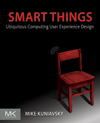Back in February I talked about World of Warcraft and Feedback. I'm on to a new game, The Sims 2 from Electronic Arts/Maxis. My insight about Warcraft was that automatic feedback across a number of progress indicators is a seductive way to measure our success in the virtual world--part of the satisfaction of the game is watching the progress bars go up--and that it could be a model for how automated feedback could be created in a ubiquitous computing environment. The Sims 2 takes this to a new and more intimate level. The game is much closer to our reality, so its metrics start seeming eerily familiar, making its simulation that much more emotionally resonant. It's also a good place to study what kind of feedback would actually be appropriate in an instrumented environment.

(image from Wikipedia, showing a number of elements of the game)
Sims 2's progress indicators are divided into three categories: Needs, Aspirations and Skills.
- Food
- Comfort
- Hygiene
- Bladder
- Energy
- Fun
- Social
- Environment
- Wealth
- Knowledge
- Family
- Romance
- Popularity
These, in turn, spawn wants and fears, which are represented by icons
- Cooking
- Mechanical
- Charisma
- Body
- Logic
- Creativity
- Cleaning
[Tangentially, this list starts to amusingly betray many of the deeply American and, specifically, Northern Californian values in the game. They don't seem to aspire to be great buck hunters or farmers, they carpool; they move house pretty easily; gene mixing is encouraged. They probably vote Democrat. ;-)]
Maxis must have thought about this pretty carefully during game design and it's interesting to see what they came up with. I just started playing the game, but it's already starting to seem like a good list to start thinking about the implications for where to start incorporating these ideas into the physical world. Some things are clearly more difficult than others, but taking a broad view, some interesting ideas emerge.
For example, you can immediately see how instrumenting basic needs with sensors and alarms is already the focus of people working in the medical and geriatric technology fields. It may not make sense for a healthy person to have a piece of hardware worry about their bladder, but in a hospital situation it becomes critical. For a person suffering from Alzheimer's Disease, notification of a need for food may be important (hell, I sometimes need to be reminded to eat.). How do you measure "fun"?
This list is profoundly user-centered. It's not starting with a monitoring technology and saying "well, if we tracked every single person everywhere and tried to identify what they're doing based on Baysian filtering, how could we make money off of that?" Instead, its focus is: here's what people desire from life and here are the wants they try to satisfy, how can we support them with technology that helps them track their progress? How can we help people feel less like pawns and more like Sims? (and I know that that still doesn't make them feel like people, but I feel it's a step in the right direction)




The great irony about this particular game is that the more time one spends making the lives of the Sims more interesting by attending to their Needs, Aspirations and Skills, the less time one has to spend on these things in one's own actual life.